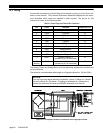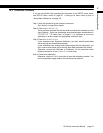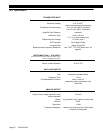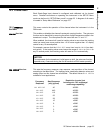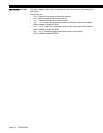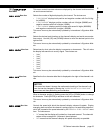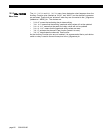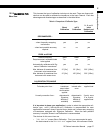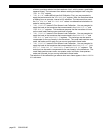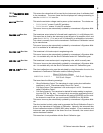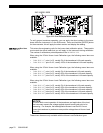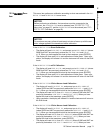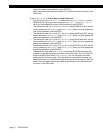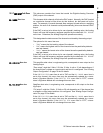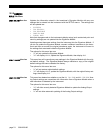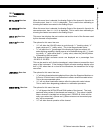
page 68 008-0608-00
a known, precision resistor into the transducer circuit, which causes a predictable
apparent signal. The instrument then takes a reading and adjusts itself using the
“
SHUNT CAL VALUE
” register.
•“
TYPE= MV/V CAL
” means Millivolt-per-Volt Calibration. First, you are prompted to
apply the load entered in the “
ZERO SCALE VALUE
” register. Next, the instrument takes
a reading from an accurate, internal mV/V reference. The instrument then uses
the “
FULL SCALE MV/V
” and “
FULL SCALE VALUE
” values in mathematical calculations to
scale its tracking values.
•“
TYPE= 2 POINT CAL
” means 2-Point Known Load Calibration. You are prompted to
apply the loads to the transducer that were entered in the “
KNOWN POINT 1/2
” and
“
KNOWN POINT 2/2
” registers. This technique assumes that the transducer is linear,
so the usual loads used are zero scale and full scale.
•“
TYPE= 3 POINT CAL
” means 3-Point Known Load Calibration. You are prompted to
apply the loads to the transducer that were entered in the “
KNOWN POINT 1/3
” and
“
KNOWN POINT 2/3
” and “
KNOWN POINT 3/3
” registers. This technique can be used to
compensate for the non-linearity in the transducer. The usual loads used are zero
scale, half scale and full scale, but you are not restricted to these loads.
•“
TYPE= 5 POINT CAL
” means 5-Point Known Load Calibration. You are prompted to
apply the loads to the transducer that were entered in the “
KNOWN POINT 1/5
”, “
KNOWN
POINT 2/5
”, “
KNOWN POINT 3/5
”, “
KNOWN POINT 4/5
” and “
KNOWN POINT 5/5
” registers. This
technique can be used to compensate for the non-linearity in the transducer. The
usual loads used are zero scale, one-quarter scale, half scale, three-quarters
scale and full scale, but you are not restricted to these loads.
The selection of the calibration type affects what menu items appear in the
CALIBRATION
DATA
sub-menu.



